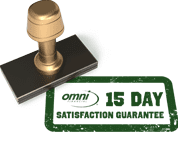At Omni we are staffed by veterans, military spouses and military advocates. Our team understands that moving is part of the military experience. With hundreds of thousands of active duty service members stationed at military bases — and well over 150,000 abroad — permanent changes of station (PCS) come with the territory. In fact, in the average year, an estimated 33% of service members will receive a PCS order, according to a study conducted by the Rand Corporation.
While sweeping numbers of military family members know what a PCS is like, it’s safe to say that no two permanent changes of station are alike. This is especially true if your next location is overseas, or outside the continental United States (OCONUS). The ability to see the world and experience different cultures is part of what makes the military lifestyle so unique and special.
But as you might expect, an OCONUS PCS is more involved than a CONUS PCS. As such, your PCS checklist likely needs to be more fleshed out to ensure issues like housing, sponsorship, shipping and schooling for your child are covered.
Whether you recently received an OCONUS PCS order or you’re thinking ahead, here are a few of the things to include as part of your PCS checklist.
Touch base with your sponsor
From the language to the food to the people, culture shock is a very common feeling when traveling or moving overseas. And that’s especially true if you’ve never been outside the continental United States. An overseas sponsor can make the transition much smoother. An overseas sponsor is typically in the same military branch as you (they may even be in the same gaining unit) and are currently living where you’ll be moving to. They’ve been through the overseas PCS experience before so they can provide you with a PCS tip or two for how to prepare. For example, are you bringing a pet with you? Do you have any familiarity with the native language? Are there certain cities or neighborhoods that are best to avoid? An overseas sponsor should be able to answer these questions for you so moving is more seamless.
You’ll likely be assigned a sponsor, so much of the work is already done. But try to connect with your military sponsor as early as you can to establish a rapport and feel more comfortable asking questions you may be reluctant to ask a sponsor you just met.
Seek permission for command sponsorship
Just because you have a military family doesn’t mean that they automatically come with you upon receiving your PCS order. You need to make a formal request. That’s accomplished through command sponsorship. Otherwise known as accompanied orders, command sponsorship can provide added rest assurance to your OCONUS PCS by virtue of having your loved ones by your side, be it your military spouse, children or significant other.
It’s possible that command sponsorship was already included in your original PCS order, but if it wasn’t, go through your chain of command so your family can get the same privileges as you. Similar to contacting your sponsor, try to take care of this as early as possible so you can get your family the proper documentation and passports they need to make the journey. In short, “obtain command sponsorship” should be high up on your PCS checklist of priorities.
Your family members’ ability to receive command sponsorship isn’t quite as simple as asking, though. For example, only dependents are allowed to join you. The Department of Defense defines an acquired dependent as any person who “becomes a dependent through marriage, adoption or other action during the service member’s current tour of duty.” The keyword here is “during.” If the relationship existed prior to one’s present tour of duty, then the acquired dependent tag is null and void.
Dependents don’t necessarily need to be children. A dependent can also be a brother, sister, parent (biological or adoptive), grandchild or grandparent, among several others. That person must also be unable to make it on his or her own without a military member’s financial support.
Here’s a link to the Joint Travel Regulations guide. The relevant section pertaining to dependents is on page 512 and 507 for acquired dependents.
Determine what belongings can and can’t be shipped
Depending on how long you’ll be at your new location — most PCS orders are for three years — you’ll probably want to ship some bulky items that you’d like to have in your home or for extracurricular usage, such as a boat, recreational vehicle, all-terrain vehicle or car. Perhaps you want to ship certain firearms for protection or for target practice.
It’s important to understand that the shipping rules and regulations in the U.S. are different than OCONUS; it’s easy to forget this when you’re accustomed to domestic travel. For example, several countries have nationwide bans on firearms or restrict the ones that can be owned. Be sure to look into this by speaking with your sponsor or doing your own research online.
As for recreational vehicles, reach out to your transportation office. They should have details on what you can ship and what to leave back in the States.
Decide what to ship as unaccompanied baggage
In the military context, “unaccompanied baggage” refers to items that you’ll likely need to use immediately, or at least before other items, such as household goods. As noted by the Department of Defense, unaccompanied baggage items are separated from those items that are less pressing and sent as their own package and on an expedited timeline. Here are a few common things military members designate as unaccompanied baggage:
● Cookware
● Silverware
● Cribs
● Baby carriages
● Clothing
● Important documents
● Playpens
These and other belongings are frequently given unaccompanied baggage status. Just be mindful of the fact that they count toward your total weight allowance, which your transportation office will tell you what that amount is. They may also be able to tell you what items cannot be shipped as unaccompanied baggage. Common exclusions include furniture and major appliances, such as refrigerators, washing machines and dishwashers, among others.
Put together a PCS binder to store important documents
Think about all the documentation that’s involved with a PCS in CONUS; an OCONUS PCS requires a whole lot more, from birth certificates to marriage licenses to your child or children’s school records.
Instead of obtaining the paperwork in a piecemeal fashion, it’s far better to compile it all together so it’s all in one place. You can do that by building a PCS binder. Any three ring binder should do the trick and will allow you to store things like passports, immunization records, car titles, vehicle shipping information, veterinary paperwork and other documents so there’s less run around and more organization.
Update your health plan
With more than 10 million active duty and veterans receiving health benefits through the Department of Defense, it’s likely that you’re covered by TRICARE, a comprehensive health insurance program that’s been in place for approximately 30 years. As you may or may not be aware, there are several different plan options that you can choose from as a TRICARE recipient. One of them is called Prime Overseas. As its title suggests, TRICARE Prime Overseas is an insurance plan that goes with you so your medical expenses will be covered should you be injured or become seriously ill while you’re abroad.
Be sure to visit Military Benefit Association’s website for more details on the differences between the plans and what is the most appropriate for you and your family based on your situation.
Determine what COVID-19 mitigation policies are in place
More than two years removed from the initial outbreak, the coronavirus has changed life’s norms for billions of people around the world in one form or another, but each country has responded to the pandemic a bit differently. For example, students continued to attend school in Sweden, while in countries like the U.S. and Canada, hybrid learning environments were standard operating procedure.
While just about all learning facilities in the U.S. are now back to being 100% in-class, that may not be the case for your kids if they’re coming with you. See what you can do to find out by visiting the website of your child’s soon-to-be new school or check with your military sponsor. COVID-19 has been a very fluid situation so what may be the case at the moment may be different once you actually arrive.
Additionally, determine what the rules are regarding vaccination status. As of Feb. 10, over 6.9 million vaccine doses have been administered to full-time active-duty service members. But there may be some who have medical or religious exemptions. However, the country you’re traveling to may have different rules in place as to what circumstances make someone exempt.
Here as well, talk to your command sponsor for more guidance on vaccination status.
Prepare your pet
Something else that you’ll want to look into upon receiving your overseas PCS order relates to pets. Dogs may be man’s best friends in the U.S., but in other parts of the world, there are restrictions on the dog breeds that residents and citizens are allowed to own. Such restrictions are in place in Germany, Denmark, Spain, Finland, Italy and several other countries. Some of the most common breeds of dogs that are barred from entering various countries include the American Bull Terrier, Rottweiler, Pit Bull Terrier and Brazilian Mastiff, according to Boogie The Pug.
Assuming you have a dog that is OK to bring along, it’s also important to ensure that your pet has been given a clean bill of health and gotten their shots. Talk to your veterinarian. If your dog or cat is due to receive a shot next year, they may be able to move it up so this won’t be a concern when you’re 12 months into your PCS order.
Additionally, reach out to your airline. Commercial airlines typically have rules in place regarding how they need to be checked and what fees apply. Then again, if your dog is a service animal, they may be able to ride with you in the passenger cabin rather than in cargo.
If you feel like it’s best for them to remain stateside and wait for your return, then plan accordingly by setting them up with a pet-loving relative, friend, family member or anywhere you can be sure they’ll be comfortable and properly taken care of.
Familiarize yourself with the majority language
Did you know that there are over 6,500 different languages spoken globally? While English is the most common one of them all, Mandarin Chinese isn’t far behind, which isn’t surprising given China is the most populated country in the world.
Learning an entirely different language can be quite challenging, but if you’re moving to a country where English isn’t the native one, it can be helpful to familiarize yourself with Spanish, French, Hindi or whatever tongue is the most widely shared.
From Babbel to Duolingo to Memrise and more, there are a host of very helpful language learning apps that you can download to your phone or mobile device, some of which are free. But you can also take advantage of translation services. Military OneSource offers these through its website.
Renew your driver’s license
When was the last time you had to update your driver’s license? Generally speaking, states require they be renewed once every five years, so if it’s getting close to that time again, you may want to renew before you leave. For the most part, driver’s license renewal is something you can do while you’re overseas, but the process isn’t exactly seamless given the requirements that may be in place in your host country which may differ from those in the States. In some instances, your ability to obtain an overseas driver’s license may be compromised if your American one has expired.
Addressing all the items on your PCS checklists takes time and getting matters addressed may also take money. Omni Financial may be able to help. In addition to our blog, which features articles containing various PCS tips, tricks and suggestions, we also provide military loans to active duty members. Contact us today to learn more about our military loan offerings. We back up all of our personal loans with a 15 day satisfaction guarantee.
The information provided in this blog post is for informational purposes only. It should not be considered legal or financial advice. You should consult with a financial professional to determine what may be best for your individual needs.

Friendship Rewards Program
Refer a friend and get a $25 Omni Gift Card



